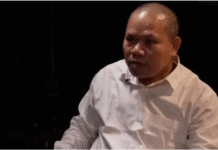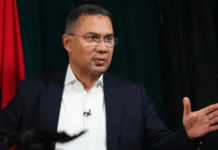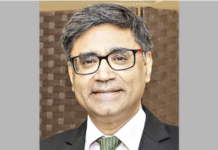
As the interim government is going to complete its six months in office, calls for the national election are growing louder. Several reform commissions have already submitted their reports, and the government may soon engage with political parties. Nahid Islam, a July uprising leader, who is now serving as an adviser to the interim government, lately spoke with The Daily Star’s Wasim Bin Habib and Baharam Khan on a range of pressing issues.
TDS: How would you evaluate the six months since the interim government took office?
Nahid: We assumed responsibilities in an extraordinary situation and have been navigating a kind of revolutionary phase. It was an unprecedented situation for Bangladesh. Naturally, there was tension and uncertainty. However, over the past six months, the situation has become more stable.
Although progress is slow, things are improving. People may have expected faster actions, but various constraints posed limitations. Despite these, the government is doing its best.
TDS: What were the main challenges during this time?
Nahid: The biggest challenges were maintaining law and order and stabilising the prices of essentials. Ensuring national unity while meeting people’s expectations has always been a challenge. As everyone can see, the government’s structure is small, but it’s work scope is quite extensive. We’ve to move forwards by maintaining a balance among political parties while keeping national unity intact. Meanwhile, the reform commissions are submitting their reports. begun, with arrests already underway. So, I believe we’re making progress. If the political parties show more goodwill, we can advance at a faster pace.
TDS: What were the things you wanted to achieve during this period but couldn’t?
Nahid: There are some regrets. If we could take some stricter measures from the very beginning, changes could have come sooner. Over these six months, we haven’t been able to improve the administrative and law and order situations to the desired level. That said, our biggest achievement has been the transition from uncertainty to stability. In the early days, there were speculations about whether the government would remain in power, or there would be a counter-revolution. There were conspiracies within the country, along with geopolitical pressures. There was an international campaign against us, and tensions surrounding minority communities in the country were deliberately flared. Now, those tensions have largely subsided. I believe this is significant progress.
TDS: As for the law-and-order situation, incidents like muggings are occurring daily, even in broad daylight, which is concerning.
Nahid: Yes, that’s true — some challenges still exist. Incidents of mugging and criminal activities are occurring in some areas. We’re trying to restore the police’s morale to its previous state. The police force is currently undergoing a transformation including new training and restructuring. However, such comprehensive changes take time.
For example, many members of the Dhaka Metropolitan Police have been transferred outside Dhaka, and new officers have been brought to the capital. This transition period has created temporary challenges, as officers need time to adjust to their new environments. Initially, there was criticism when the police were perceived as inactive (following the fall of the AL government). Then when they took decisive actions, there was criticism again. Such contradictions make it difficult for them to stabilise. That said, we are committed to ensuring that the police regain full operational capacity.
TDS: Why was the police uniform changed? Do you think it’ll lead to any qualitative improvement in the force?
Nahid: We don’t expect a change in the uniform will solve everything, but it carries symbolic and psychological significance. A few days ago, I visited the graves of some martyrs. Relatives of one of the martyrs were infuriated upon seeing uniformed police officers who were accompanying me, even though they had no involvement in the deaths. The reactions might have been different if the officers were in plainclothes, as the primary identity of a force is represented through its uniform. This aspect is being taken into consideration. On one hand, we expect police to protect human rights, while on the other, they’re responsible for controlling riots. The government is working to improve police effectiveness through advanced training.
TDS: Various shrines have been attacked, while a girls’ football match was disrupted. What’re the reasons?
Nahid: These incidents are deeply concerning and unacceptable, and may have occurred due to gaps in law-and-order situation. We acknowledge that such events are embarrassing for the government. We’re taking these incidents seriously and trying to take appropriate action, while also considering compensation to the affected shrines.
TDS: The students and youth say the election should be held after reforms. On the other hand, the chief adviser has announced an election timeline. Is there a conflicting position between these two issues?
Nahid: From the beginning, we’ve maintained that elections and reforms are not contradictory. In fact, while elections are crucial for democracy, but reforms are equally necessary to ensure fair polls. Over the past 15 years, elections haven’t been conducted properly. The people have lost much of their faith in the electoral institutions. During the (July-August) movement, we said we wanted to create a new arrangement to prevent the return of fascism. We want to ensure that no future government can manipulate the electoral system for party or personal gains. This is a long-term process, but we want to lay the foundation now. We want to take political (parties’) commitment so that whoever comes to power will continue the reforms.
TDS: Do you think the reforms can be completed within the timeframe set by the chief adviser?
Nahid: If you notice, the first six reform commissions we formed are related to state structure and electoral reforms. Some of the commissions have already submitted their reports. We plan to discuss these issues with political parties this month. The parties were eager to know a specific timeframe. From that perspective, we believe the timeframe given by the chief adviser is consistent with the reform initiatives.
TDS: BNP previously suggested that the election could be held on August 5, terming it a historic date. What is your response to this?
Nahid: August 5 will also be a historic date in 2026. If this date is chosen as a milestone for the democratic journey, I don’t see an issue.
TDS: There are discussions regarding a political party by the students and youth, and the resignation of two advisers including yourself. Will you really be resigning?
Nahid: As advisers, we’re still focused on the government responsibilities. No decision has yet been made regarding our resignations.
TDS: Since you were a key figure in the July uprising, many expect you to join a party. What’s your personal view on this?
Nahid: I haven’t decided yet. My focus remains on where I can contribute most effectively. I need to carefully assess whether I can make a greater impact within the government or by working on the ground. When the time comes, I will make that decision based on what best serves the country.
TDS: BNP Secretary General Mirza Fakhrul has raised questions about the government’s neutrality. Do you think this is related to the formation of the students’ party?
Nahid: The students didn’t form a party immediately after the uprising in order to gain the trust of the political parties. If they had, many other would have shown interest in being involved and they still might. So, you can understand the perspective of the youth. The government prioritising the advice of political parties in making key decisions. When the issue of removing the president arose, we did the same. Therefore, BNP’s allegations of bias aren’t justified. I don’t know if they’re considering any alternative plan or other options by removing Dr Yunus. If they are, I don’t believe it will serve them or the country well.
TDS: Is there any crack developing in national unity?
Nahid:The uprising brought together people from different political and ideological backgrounds. Naturally, there were differences, but that doesn’t mean there is a lack of unity. During the movement, we took a united stance. So, differences will exist, but this does not mean it’s a weakness.
We don’t expect everyone to have the same stance over every issue. However, the key question is how united we can remain on major national challenges. I believe that national unity is still intact. If it weren’t and political parties didn’t cooperate, it would’ve been more difficult to run the government.
I hope this cooperation will continue in the future. Through our collective efforts, if we can maintain a consistent path towards reforms and ensure a responsible democratic transition, it’ll be an achievement for all, especially those in the upcoming government. Their task will be easier.
TDS: How much reform can realistically be accomplished? There isn’t much time.
Nahid: That’s precisely why we weren’t eager to announce an election timeline in haste. If even the minimal expectations of the people, shaped by the mass uprising and consequent bloodshed, are not met, they will lose faith in us and take to the streets. Sheikh Hasina’s government was also an “elected government” in 2008, but it committed misdeeds. This suggests that an elected government doesn’t necessarily guarantee the country’s safety. We’re aware of the recommendations made by “Teen Joter Ruprekha (roughly translated to ‘tri-alliance outline’)” in 1990, but those plans weren’t implemented. This time, we aim to create a roadmap for the public through reforms in the state structure, which can continue no matter who comes to power next.
TDS: Several journalists have been arrested and are in jail. Many were charged with murder, and some were laid off. Can these not be seen as a threat to freedom of press?
Nahid: No one has been arrested for criticising the interim government. However, some individuals in the media are facing legal proceedings due to allegations of criminal activity that extend beyond journalism. Many of those who were closely involved with the previous regime and failed to uphold journalistic ethics, who were complicit with fascism, are accused of being involved in (the July) killings. However, I believe the role of journalists and the media over the past 15 years needs deeper discussion. It isn’t possible to address these through the legal framework. There must also be some form of accountability for those who committed moral or social wrongs as collaborators of fascism.If the government takes such measures, it may be questioned. I think the initiative should come from within the media itself through independent reviews and professional standards bodies.
TDS: While there may be allegations of financial wrongdoings against some journalists, but many are charged with murder. Isn’t this putting pressure on other journalists?
Nahid: We’ve ensured a process for review if any case isn’t filed properly. We’ve also communicated with the law ministry regarding the accused in cases who have applied for a review. Some journalists are also facing corruption allegations, which are being investigated by the Anti-Corruption Commission and other relevant government agencies. The government isn’t pressuring the media, but there is undeniable public frustration. However, certain groups have portrayed this internationally as a crackdown on press freedom, which does not reflect the full picture. In the past, media outlets were forcibly shut down following changes in government. That hasn’t happened since this government was formed, though there’s resentment among the people over the role of some media outlets.
I won’t take names, but certain media outlets directly supported the fascist government during the July uprising. Was that ethical? To this day, they haven’t acknowledged their role, nor have they explained their actions.They didn’t say they wouldn’t repeat such practices in the future. If the journalists who compromised ethical standards in the past takeresponsibility, acknowledge their misdeeds, and commit to not doing so in the future, this pressure perhaps will also lessen.
TDS: The recently approved draft of the Cyber Protection Ordinance-2024 contains several repressive provisions, as highlighted by civil society groups such as Transparency International Bangladesh. What are your thoughts?
Nahid: The law is being revised to ensure journalists and all sectors of society have freedom of speech and expression. I admit our government rushed the drafting process. The intention was to pass it quickly so that the victims of false cases filed under the Cyber Security Act could get some relief. Now, we’ve decided to cancel cases related to speech and writing offenses.
TDS: Will the government take into account the concerns raised by stakeholders?
Nahid: Absolutely. Further discussions will take place. We aim to create the best possible law with input from all stakeholders. I believe we can do that if stakeholder meetings are held properly.
TDS: In your opinion, what will be the future of Awami League politics? Will it be able to participate in the next polls? Will it be banned?
Nahid: It can’t be definitively said at this moment. Whether Awami League should be banned or allowed to contest polle is something that requires national consensus. It’ll also depend on the decisions from the courts and the Election Commission. However, as those who led the uprising, we believe Awami League has lost its moral and legal legitimacy to continue politics.
TDS: But you have mentioned reconciliation…
Nahid: Yes, but not under Awami League’s banner. Those from the Sheikh family or individuals identified as corrupt or involved in mass killings have no right to continue politics.
TDS: What about Awami League members who were not involved in corruption or violence?
Nahid: There is no room for politics under the name or ideology of Awami League. Their ideology is fascist, which led to 15 years of oppression and mass killings. Those who realise their mistakes must abandon that ideology. Their political and civil rights remain intact — they can join other parties or form a new one.
TDS: If someone from the Awami League, who wants a clean image, wants to join the Anti-discrimination Students’ Movement – would you accept them?
Nahid: I am not currently involved with the platform, so I don’t want to comment.
TDS: You don’t want Awami League to continue politics, but there’s no provision for prosecuting a party in the amended ICT Act…
Nahid: At that time, the decision was made based on consultations with national and international stakeholders. Legal experts and learned advisers of the advisory council gave their input.
Our main focus is to ensure that the judicial process is not questioned. However, there’re other ways to ban a party outside courts as well.
TDS: Is such an initiative being taken?
Nahid: For now, we’re focusing on the judicial process. Once progress is made in that regard, decisions on related matters will become easier.
TDS: Critics say if the prosecution of a party was included in the law, Jamaat-e-Islami would have to be prosecuted for its 1971 crimes as well…
Nahid: That’s not the case at all. After discussing with experts, all necessary actions to maintain international standards have been taken.
TDS: Could you share something about the progress of the judicial process in ICT?
Nahid: We hope that the judicial proceedings of the important cases will begin before August.
TDS: Will the election be held after that?
Nahid: It’ll depend on the judicial timeline. However, our aim is for the public to see justice being served, and then move forward with a fair and credible election.
TDS: If everything goes well, we’ll be heading toward an election atmosphere in six months. What do you plan to do during this time?
Nahid: Law and order, along with the economic condition, need further improvement. If the police aren’t properly operational, holding an election will be difficult. Many people might’ve thought that an election will fix everything, but that’s not the case.
A good election requires a conducive atmosphere. We want to organise the most transparent and credible election in the country’s history. The 1991 election is often considered the country’s fairest election, but we aim to set an even higher standard.
TDS: What challenges do you foresee?
Nahid: Many Awami League goons are conspiring to destabilise the government. They’re attempting various forms of sabotage with the support of foreign powers. Leaders and activists of different political parties in the country are getting involved in extortion and other criminal activities. We need to tackle these while moving towards the election. This isn’t just for polls; it’s essential for foreign investment and internal business environment.
TDS: What does the interim government want to achieve within its first year?
Nahid: The most significant one could be visible progress in the trial of the July massacre. People across the country are eagerly waiting for this. We want to ensure that martyr families and the injured are adequately compensated and rehabilitated. Law and order should reach a satisfactory level. Reform initiatives should lead to a political consensus so that we can present a framework for unity to the nation and ensure that future governments will continue the rest of the work.









